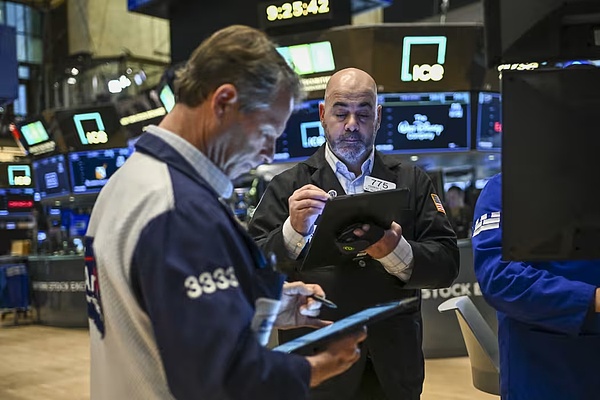Source: Barron's Chinese
Nine out of ten respondents believe that U.S. stocks are overvalued, the highest level in more than two decades. Significant changes in trade and other policies in a very short period of time have increased uncertainty about the U.S. outlook.
Some might argue that the United States is the best investment destination, with the largest and most innovative technology companies, the dollar's dominance is unrivaled, and U.S. Treasuries the safest assets in the world. However, this year Wall Street fund managers seem reluctant to vouch for the United States.
Investors' confidence in "American exceptionalism" is waning, Bank of America (BofA) concluded based on a recent study. Investors' confidence in investing in the United States has declined, according to the latest fund manager survey released by Bank of America, a sign that investors are increasingly taking into account recent geopolitical turmoil and uncertainty.

More than a third of fund managers believe the "American exceptionalism" narrative is losing momentum, with 36% expecting both U.S. stocks and the dollar to be lower by the end of the year, according to Bank of America's February FX and Rates Sentiment Survey.
"American exceptionalism is not dead, but the warning signs are growing," Alex Cohen, a foreign exchange strategist at Bank of America, wrote in a research note earlier in February.
Similar themes were reflected in Bank of America's February Global Fund Manager Survey, which had a larger sample size of nearly 200 fund managers managing more than $400 billion in assets. The survey results, released on February 18, provide a glimpse into fund managers' current asset allocation decisions.
Fund managers are no longer as keen on the “Big Seven” tech stocks or the dollar, both of which BofA believes have benefited from “American exceptionalism.” In the February survey, 73% of fund managers were most keen to buy those two asset classes. That percentage looks high, but it’s down from a three-year high of 80% in January, BofA wrote in the survey.
Fund managers also have less preference for U.S. stocks: Of all asset classes, fund managers expect international stocks to be the best performer in 2025, with 34% of respondents holding that view, while only 18% of respondents think U.S. stocks will have the highest returns this year, followed by gold. In the January survey, the highest percentage of respondents said U.S. stocks would perform best this year.
This “suggests that investors’ belief in ‘American exceptionalism’ has peaked,” wrote Michael Hartnett, a strategist at BofA.
The survey also showed an increase in the percentage of respondents who thought the Euro Stoxx index would post the biggest gain this year, a reversal from the results of the January survey, when the highest percentage of respondents thought the Nasdaq Composite would post the biggest gain this year. Nine out of ten respondents believed that U.S. stocks were overvalued, the highest level in more than two decades.
Taxes more fully reflect the changing perceptions of investors toward the U.S. amid Trump’s return to the White House and escalating geopolitical tensions, with major changes in trade and other policies in a very short period of time adding to uncertainty about the U.S. outlook.
Cohen mentioned the impact of uncertainty from the escalating trade war on the narrative of “American exceptionalism” in his list of risk factors.
Both February surveys were conducted after Trump took office, while the January survey was conducted before Inauguration Day.
Tariffs can indeed reduce the total amount of U.S. imports, but it is unclear to what extent they can reduce the U.S. deficit. In fiscal 2024, which ended last September, the U.S. deficit rose to $1.83 trillion. The deficit is a major pain point for investors.
The Congressional Budget Office estimates that the deficit will remain near $1.9 trillion in fiscal 2025.
"When you hear about 'American exceptionalism' and how great the U.S. economy is compared to the rest of the world, let's just say this is a macroeconomic backdrop created by Uncle Sam's long arms and deep pockets," wrote veteran market expert David Rosenberg on Friday (February 14).
Meanwhile, the Euro Stoxx 600 index, which consists of 600 European stocks, and the German DAX index, which consists of 40 major blue-chip companies in Germany, hit record highs on Tuesday. The Euro Stoxx 50 index has risen 13% this year, compared with a 3.8% increase in the tech-heavy Nasdaq Composite Index.
European stocks are getting a boost from a range of factors. The rise in defense stocks brought about by Trump's call for European countries to increase military spending is one factor, and another is that investor confidence in the United States appears to be declining. Earlier this year, Deutsche Bank strategists recommended overweight European stocks over U.S. stocks, noting that the market had become accustomed to strong U.S. growth and ignored improvements in Europe.
Wall Street is becoming more vocal about the view that "American exceptionalism" is being challenged. Morgan Stanley last week expressed a bearish view on the dollar, with the agency's strategists saying: "We believe that the U.S. fiscal deficit will continue to expand and "American exceptionalism" has been largely priced in." Bank of America strategists pointed out in late January that the "American exceptionalism" narrative has become very expensive and has been fully priced in.
 Alex
Alex
 Alex
Alex Joy
Joy Brian
Brian Alex
Alex Joy
Joy Edmund
Edmund Joy
Joy Alex
Alex Alex
Alex Joy
Joy